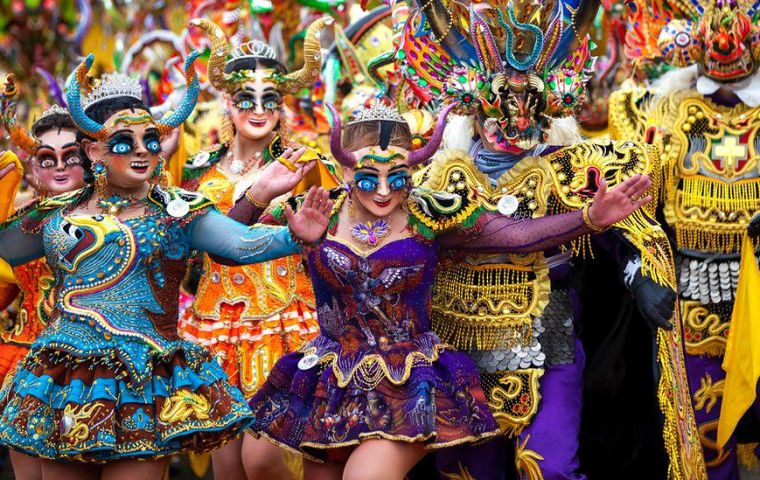MercoPress. South Atlantic News Agency
Oruro carnival parade goes on like before, albeit with face masks
 “The Oruro Carnival is culture, faith and devotion, but it is also tourism and economic reactivation,” Arce said
“The Oruro Carnival is culture, faith and devotion, but it is also tourism and economic reactivation,” Arce said Rio de Janeiro’s street carnival parades may be off but other parts of South America are returning to their traditional celebrations following a ban during 2021 as a result of COVID-19 measures.
That is the case, for example, of Oruro, in Bolivia, where colorful street parades were seen starting Saturday, when over 20,000 dancers in 52 ensembles took to the streets after 2021’s cancellations due to the COVID-19 pandemic.
Participating musicians and dancers were required to be vaccinated against SARS-CoV-2 and were asked to produce their certifications in order to be allowed through, according to press reports.
Oruro’s Police Department deployed around 4,000 officers during the festivities, Deputy Chief Colonel Raúl Rodríguez told reporters.
Saturday’s parades featured an unprecedented item: face masks. Other than that, drums and cymbals sounded again as fervent dancers tried to reach the feet of the Virgen del Socavón, the patron saint of Oruro, after a three-kilometer stretch.
Bolivian President Luis Arce Catacora praised Oruro’s Carnival which -he said- was a masterpiece and an inalienable part of mankind’s, oral and intangible heritage.
“The Oruro Carnival is culture, faith, and devotion, but it is also tourism and economic reactivation. Today, thanks to the successful actions in the fight against the pandemic, we once again show the world this Masterpiece, an Oral and Intangible Heritage of Humanity.




Top Comments
Disclaimer & comment rulesCommenting for this story is now closed.
If you have a Facebook account, become a fan and comment on our Facebook Page!